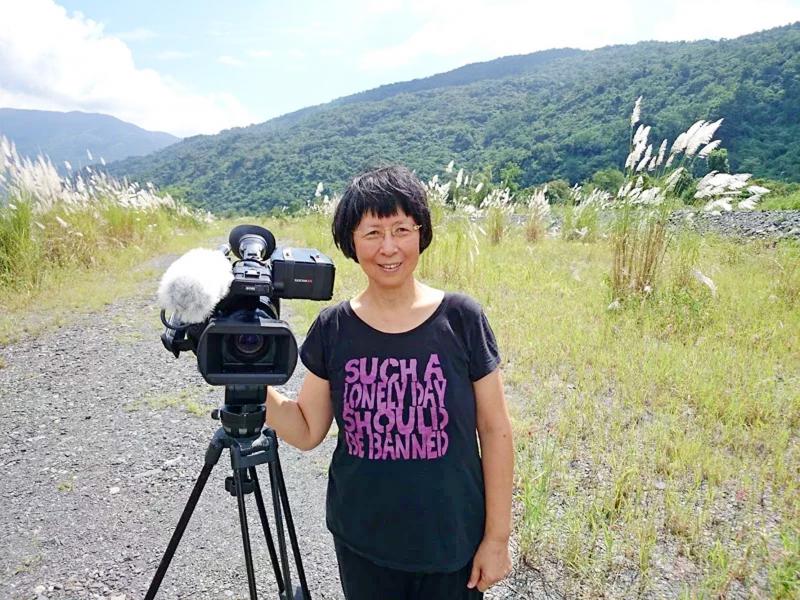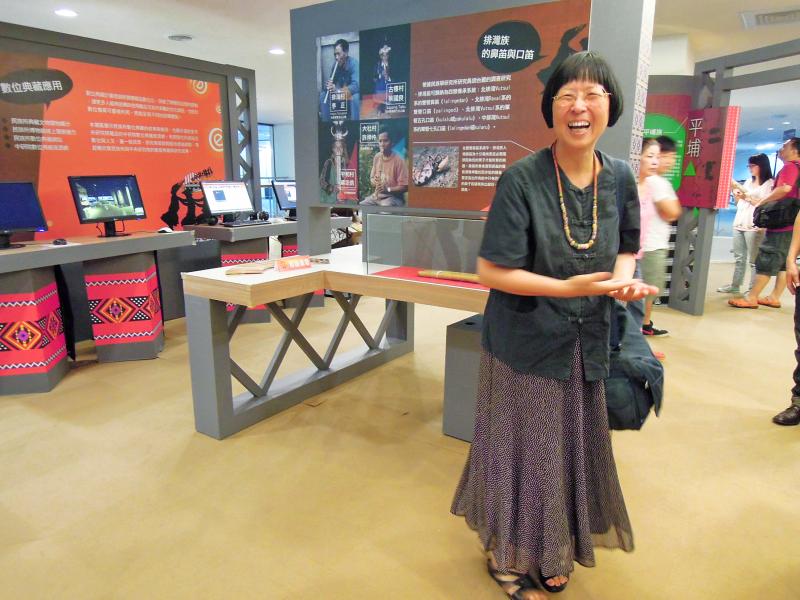Hu Tai-li, an anthropologist, documentary director, and researcher at the Academia Sinica’s Institute of Ethnology, passed away on May 7 at the age of 72 following an illness. She worked with both pen and camera, writing academic papers while making documentaries. The countless documentaries and writings she produced over decades have greatly inspired studies of Taiwan’s indigenous peoples, new immigrants, the relationship between mainlanders and other ethnic communities in Taiwan, as well as gender issues.
Minister of Culture Lee Yung-te said that as an anthropologist, Hu spent her life documenting Taiwan’s rural industrialization and social changes through ethnography and videos. She began to study mainland-born veteran soldiers who came with then-president Chiang Kai-Shek to Taiwan and made several ethnographic documentaries even before the lifting of martial law, when it was still a politically sensitive issue. Hu’s contribution in recording and preserving Taiwan’s multiculturalism is truly remarkable.
Hu’s book Sex and Death, published in 1986, was a record of, and reflection on, her experience conducting field research in Papua New Guinea, an anthropologists’ “dream land,” after earning her doctorate from City University of New York, and before returning to Taiwan.

Photo courtesy of Hu Tai-li 照片:資料照,胡台麗提供
“We often worry that the culture of indegenous tribes is on the verge of disappearing, but we don’t ask whether our own culture is about to disappear,” Hu wrote in the book. “If we are not willing to abandon our prejudices, and face our own and other ethnic cultures humbly, we will never escape the fate of being someone with a narrow view of the world, just like a frog in a well,” she wrote.
It was also in the 1980s that Hu started to make documentaries, and insisted on filming in the ethnographic method of anthropology. The Return of Gods and Ancestors: Paiwan Five Year Ceremony released in 1984 was the first documentary to use synchronized sound recording; in 1993, Lanyu Viewpoint won the Golden Horse Award for Best Documentary; Passing Through My Mother-in-law’s Village released in 1997 became the first Taiwanese documentary screened at commercial theaters in Taiwan.
To encourage other anthropologists, at the time Hu wrote: “If anthropologists do not take the initiative to come forward and make ethnographic films, audiences in Taiwan would have no choice but to receive the information about the indigenous peoples through folk-like images and representation.”

Photo courtesy of Academia Sinica Center for Digital Cultures 照片:中央研究院數位文化中心提供
Hu’s way of doing anthropological and ethnographic research by making documentaries was not approved of by the academic community in the early days, who believed that academic research should be published in writing. However, Hu insisted on using both words and images. She once said that “text and image have their own characteristics and shortcomings. I often feel dissatisfied if they are simply presented in a certain form, so I will pursue different forms.”
(Translated by Lin Lee-kai, Taipei Times)
人類學家、紀錄片導演、中央研究院民族學研究所研究員胡台麗,於五月七日病逝,享壽七十二歲。她一手拿筆寫學術論文,一手拿攝影機拍攝影像,數十年來留下多部紀錄片及無數論著,為台灣原住民、新移民、省籍及性別議題研究帶來無限啟發。
文化部長李永得表示,胡台麗作為人類學者,畢生透過民族誌及影像,關注台灣農村工業化與社會變遷,從解嚴前便開始從事當時屬於敏感議題的外省籍退伍軍人研究,並拍攝多部民族誌紀錄片,對於台灣多元文化的記錄與保存貢獻卓著。
胡台麗一九八六年出版《性與死》,這是她個人在完成紐約市立大學人類學博士學位之後,返國途中「順道」前往人類學家的夢土新幾內亞,留下理性與感性兼具的見聞錄。
胡台麗在書中寫道,「我們常常擔心『原始部落』的文化快消失了,卻沒有問自己的文化是不是也快要消失了?」、「我們如果不肯拋棄成見,虛心地面對自己和別的族群文化,將永遠不能逃脫井底之蛙的命運。」
胡台麗的紀錄片起點也在一九八○年代,而且堅持以人類學民族誌的方式拍攝,一九八四年《神祖之靈歸來:排灣族五年祭》是首部採取同步錄音的紀錄片;一九九三年《蘭嶼觀點》獲金馬獎最佳紀錄片;一九九七年《穿過婆家村》是首部進入商業戲院放映的台灣紀錄片。
胡台麗曾在當時寫下勉勵人類學者的話:「如果人類學者不主動站出來攝製民族誌影片,就只好任憑台灣觀眾在采風式的原住民影像中接收訊息。」
胡台麗拍攝紀錄片的方式進行人類學、民族文化研究,早期並不為學術界認同,認為學者應以文字發表論文。但胡台麗堅持文字和影像並重,曾說「文字和影像各有特色,也各有缺陷,若單純用某一種形式呈現,我常覺得不滿足,所以我會追求不同形式」。
(中央社)

A: In addition to “Mission: Impossible 8,” what other new movies are in theaters? B: “Final Destination: Bloodlines” and “The Wedding Banquet” are out. The French film “Jane Austen Wrecked My Life” will also open soon. A: The Final Destination horror movie series is so scary that I don’t dare watch it. B: Then how about “The Wedding Banquet,” which is a 2025 remake of the 1993 classic of the same title? Oscar-winning actress Youn Yuh-jung’s performance in it is highly anticipated. A: But as a fan of British writer Jane Austen, I’m more interested to see how her works

US President Donald Trump on Monday last week signed the TAKE IT DOWN ACT (Tools to Address Known Exploitation by Immobilizing Technological Deepfakes on Websites and Networks Act), bipartisan legislation that enacts stricter penalties for the distribution of non-consensual intimate imagery, sometimes called “revenge porn,” as well as deepfakes created by artificial intelligence. The measure, which goes into effect immediately, was introduced by Sen. Ted Cruz, a Republican from Texas, and Sen. Amy Klobuchar, a Democrat from Minnesota, and later gained the support of First Lady Melania Trump. Critics of the measure, which addresses both real and artificial intelligence-generated imagery, say

Cats ruled in ancient Egypt—and not just in their own minds. These clever, graceful creatures were so deeply respected by the Egyptians that harming one could lead to severe punishment, even death. But why did the Egyptians hold cats in such high regard? It wasn’t just because they were cute; cats played a crucial role in protecting the country’s grain stores from pests. As guardians of Egypt’s food supply, they were seen as sacred animals. The Egyptians honored them through Bastet, the cat-headed goddess of protection, the home and fertility. Egyptians didn’t just love cats; they worshipped them. Cats lived in luxury,

A: Wanna go see a movie during the three-day weekend for the Dragon Boat Festival? B: Sure, I wanna see “Mission: Impossible – The Final Reckoning.” A: Rumor has it that this may be actor Tom Cruise’s last mission with the Mission: Impossible action movie franchise. B: Tom was only 34 when the first installment of the series was released in 1996. Now, he’s 63 and the eighth installment is out. A: I hope he’ll stay with the series. Let’s go see him fight against AI this weekend. A: 端午節三天連假週末要不要去看電影? B: 好啊我想看 《不可能的任務:最終清算》! A: 這有可能是湯姆克魯斯最後一次為動作片《不可能》系列出任務。 B: